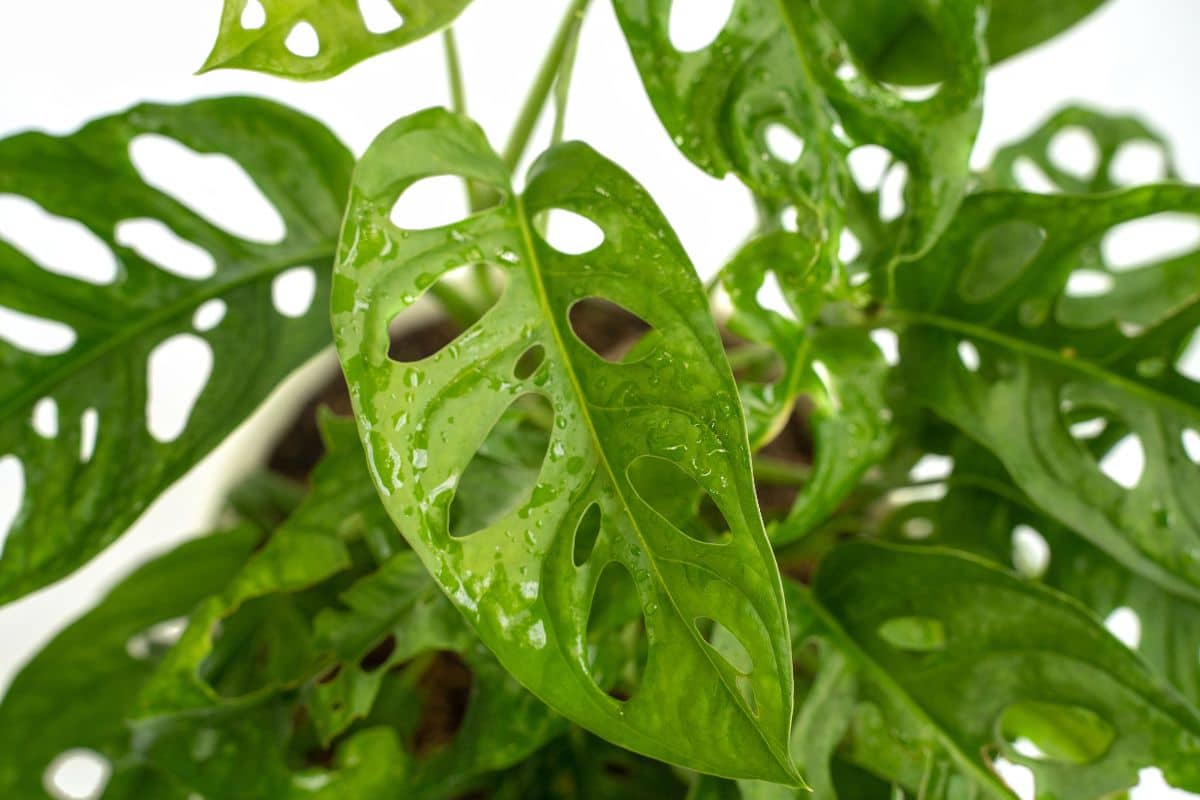Considering adding a Swiss cheese plant to your crested gecko habitat? These popular houseplants, known scientifically as Monstera deliciosa, have become increasingly common in homes and terrariums alike. However, before introducing any plant to your gecko’s environment, understanding its safety profile is essential for your pet’s wellbeing.
Safety concerns with Swiss cheese plants for crested geckos
Swiss cheese plants are not safe for crested geckos and should be avoided in their habitats. The primary reason for this caution is that Monstera deliciosa contains calcium oxalate crystals, which are toxic to many reptiles, including crested geckos. These microscopic crystals can cause significant irritation and health issues if your gecko comes into contact with them.
When a crested gecko chews on or brushes against a Swiss cheese plant, these calcium oxalate crystals can cause immediate irritation to the mouth, tongue, and digestive tract. The symptoms of Monstera toxicity in geckos may include:
- Excessive salivation or drooling
- Swelling of the mouth or tongue
- Difficulty swallowing
- Loss of appetite
- Lethargy and decreased activity
- Visible discomfort or pain
Even if your crested gecko doesn’t intentionally eat the plant, they may accidentally ingest particles while climbing on it or licking surfaces where plant sap has touched. This makes Swiss cheese plants particularly problematic in the confined space of a terrarium, where your gecko explores actively with its tongue.
It’s worth noting that the toxicity applies to all parts of the Monstera plant, including the leaves, stems, and even the attractive aerial roots. While creating an attractive office garden might include Swiss cheese plants, your gecko’s terrarium should utilize safer alternatives.
Safe plant alternatives for crested gecko habitats
Instead of Monstera deliciosa, there are many reptile-safe plants that can provide the climbing surfaces, humidity, and naturalistic environment your crested gecko needs. These alternatives offer similar benefits without the toxic risks associated with Swiss cheese plants.
Pothos and golden pothos varieties make excellent choices for crested gecko habitats. These hardy vines provide natural climbing structures and help maintain humidity levels. Unlike the Swiss cheese plant, they’re non-toxic to reptiles and can withstand the conditions inside a terrarium.
Bromeliads are another excellent option, providing natural water collection points and sturdy leaves for climbing. Their structural strength makes them ideal for supporting the weight of an adult crested gecko during exploration. Similar to moth orchids that thrive in indoor environments, many bromeliad varieties adapt well to terrarium conditions.
For ground cover, ferns like Boston ferns and bird’s nest ferns provide excellent humidity and create microhabitats that crested geckos appreciate. Unlike certain flowers that can harm garden ecosystems, these ferns pose no threat to your gecko’s health.
When selecting plants, always prioritize species that:
- Are confirmed non-toxic to reptiles
- Can thrive in high-humidity environments
- Don’t require strong direct sunlight
- Are sturdy enough to support a climbing gecko
- Don’t require fertilizers harmful to reptiles
Before adding any plant to your gecko’s habitat, thoroughly rinse it to remove pesticides or fertilizers. Growing plants specifically for terrarium use rather than purchasing commercially grown plants helps minimize chemical exposure to your pet.
Creating a safe and enriching plant environment
Despite the Swiss cheese plant being unsuitable, creating a bioactive, planted habitat for your crested gecko offers numerous benefits. Properly selected plants help maintain appropriate humidity levels, provide natural climbing surfaces, create visual barriers for security, and contribute to a more naturalistic environment.
The key to successful planted terrariums lies in proper plant selection and placement. Position climbing plants like pothos near the back and sides of the enclosure, creating vertical pathways. Place smaller ground cover plants strategically to create hiding spots and microhabitats that your gecko can explore.
Consider incorporating seasonal variety in your gecko’s habitat. Just as gardeners might plant different flowers for seasonal interest, you can rotate certain safe plants to provide environmental enrichment for your gecko. This creates novel textures and climbing experiences that stimulate natural behaviors.
When establishing plants, use a reptile-safe substrate that supports plant growth while remaining safe if accidentally ingested. Coconut coir, orchid bark, and specialized bioactive substrates provide excellent foundations for terrarium plants without posing ingestion risks to your crested gecko.
The humidity provided by appropriate terrarium plants benefits your crested gecko’s skin health, helping with proper shedding and hydration. However, ensure that plant density doesn’t create stagnant air pockets, as this can lead to fungal or bacterial issues. Proper ventilation remains essential even in heavily planted enclosures.
The importance of gecko-safe plant selection
Beyond avoiding Swiss cheese plants specifically, understanding which houseplants are safe for crested geckos represents a critical aspect of responsible reptile keeping. Many common houseplants contain toxic compounds that can harm these sensitive reptiles.
Always research plant safety before introduction to your gecko’s habitat. Consult reptile-specific plant safety lists rather than general pet toxicity information, as reptiles may have different sensitivities than mammals. When in doubt, err on the side of caution and choose plants with well-established safety records in reptile keeping.
Remember that even non-toxic plants can become problematic if treated with pesticides or chemical fertilizers. Always thoroughly wash new plants and quarantine them for several weeks before introducing them to your gecko’s environment. This practice helps eliminate potential contaminants and prevents the introduction of harmful insects.
By prioritizing your crested gecko’s safety over aesthetic considerations, you’ll create a thriving, enriching environment that supports their health while still satisfying your desire for a beautiful, naturalistic habitat – just without the Swiss cheese plant.

